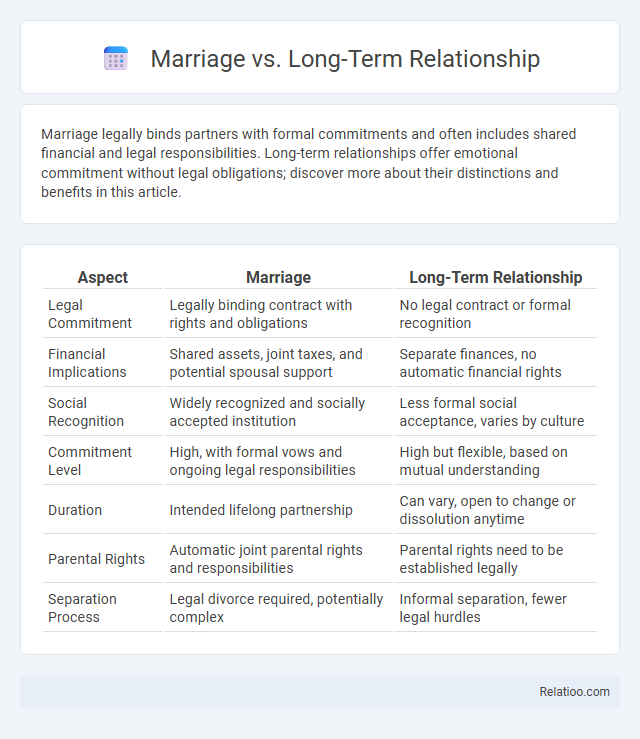Marriage legally binds partners with formal commitments and often includes shared financial and legal responsibilities. Long-term relationships offer emotional commitment without legal obligations; discover more about their distinctions and benefits in this article.
Table of Comparison
| Aspect | Marriage | Long-Term Relationship |
|---|---|---|
| Legal Commitment | Legally binding contract with rights and obligations | No legal contract or formal recognition |
| Financial Implications | Shared assets, joint taxes, and potential spousal support | Separate finances, no automatic financial rights |
| Social Recognition | Widely recognized and socially accepted institution | Less formal social acceptance, varies by culture |
| Commitment Level | High, with formal vows and ongoing legal responsibilities | High but flexible, based on mutual understanding |
| Duration | Intended lifelong partnership | Can vary, open to change or dissolution anytime |
| Parental Rights | Automatic joint parental rights and responsibilities | Parental rights need to be established legally |
| Separation Process | Legal divorce required, potentially complex | Informal separation, fewer legal hurdles |
Defining Marriage and Long-Term Relationships
Marriage is a legally and socially recognized union between two individuals, often involving formal commitments and shared responsibilities under the law. Long-term relationships, while characterized by emotional stability and mutual commitment, may lack legal recognition and formalized obligations. Understanding the distinctions between your marriage and long-term relationship can impact expectations, rights, and longevity strategies.
Legal and Social Implications
Marriage provides legally recognized rights and protections regarding property, inheritance, and decision-making, which long-term relationships often lack without formal agreements. Socially, marriage is widely acknowledged and supported by institutions, influencing societal acceptance and benefits like tax breaks and health insurance. Understanding these distinctions helps you navigate the legal and social implications of your relationship choices for greater security and recognition.
Commitment Levels: Marriage vs Long-Term Partnership
Marriage typically involves a legally binding commitment with clearly defined rights and responsibilities, which often strengthens accountability between partners. Long-term relationships can offer similar emotional and practical stability but may lack formal legal recognition, affecting aspects like asset sharing and decision-making authority. Your choice should reflect how much legal and social commitment matters to you compared to personal and emotional bonds.
Financial Considerations and Responsibilities
Marriage typically involves legally binding financial responsibilities such as joint tax filing, asset sharing, and spousal support obligations, which can offer financial security but also significant liabilities. Long-term relationships without marriage may lack formal legal protections, requiring carefully negotiated agreements to manage shared expenses, property rights, and financial responsibilities to protect both partners. Your choice between marriage and long-term partnership impacts financial planning strategies, estate considerations, and risk management, and understanding these differences is crucial for long-term financial stability and responsibility.
Emotional Security and Stability
Marriage often provides a formal framework promoting emotional security through legally recognized commitment and shared responsibilities, enhancing long-term stability. Long-term relationships without marriage can offer similar emotional bonds but may lack societal or legal reinforcement, potentially impacting perceived security. Longevity in any relationship depends on effective communication, trust, and mutual support, which are critical for maintaining emotional stability and deep connection over time.
Effects on Family and Children
Marriage often provides a legally recognized and socially supported framework that offers stability and clear parental roles, positively affecting family cohesion and children's emotional security. Long-term relationships without formal marriage can still foster strong family bonds and child development, though they may face challenges related to legal rights and societal perceptions. Your choice between marriage and long-term partnership impacts family dynamics and children's well-being, influencing access to resources, emotional stability, and social acceptance.
Societal Perceptions and Cultural Expectations
Societal perceptions often elevate marriage as a formal commitment symbolizing stability and social status, whereas long-term relationships without marriage may face skepticism or be seen as less legitimate in traditional cultures. Cultural expectations frequently pressure individuals to marry by certain ages, reinforcing marriage as the preferred framework for longevity and family structure. However, evolving norms in many societies increasingly recognize cohabitation and long-term partnerships as valid expressions of lasting commitment, challenging historical biases tied to marital status.
Decision-Making and Conflict Resolution
Effective decision-making and conflict resolution are crucial for the longevity of both marriages and long-term relationships, with communication patterns directly influencing outcomes. In marriage, formal commitment often encourages structured negotiation and compromise, while long-term relationships may rely more on flexibility and mutual understanding to maintain stability. Your ability to navigate disagreements constructively determines the strength and durability of any committed partnership.
Flexibility and Personal Growth
Marriage often involves legal and social commitments that can limit flexibility compared to long-term relationships, which allow for more adaptable personal boundaries and evolving dynamics. Long-term relationships focused on personal growth enable individuals to pursue self-discovery and change without the traditional constraints of marriage. Longevity in either arrangement depends on mutual respect and the ability to support each partner's evolving needs and aspirations over time.
Which Option Suits Your Values and Goals?
Choosing between marriage, a long-term relationship, or prioritizing longevity depends on aligning with personal values and life goals. Marriage often emphasizes legal commitment and social recognition, while long-term relationships can offer flexibility without formal obligations. Longevity in any partnership requires shared values, mutual respect, and consistent effort to sustain emotional and practical compatibility over time.

Infographic: Marriage vs Long-Term Relationship
 relatioo.com
relatioo.com